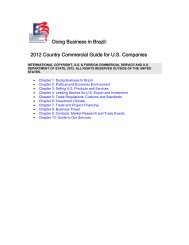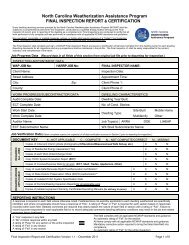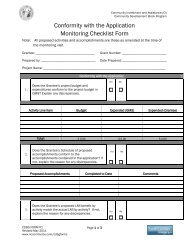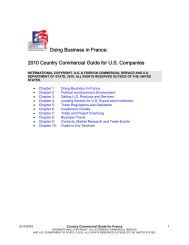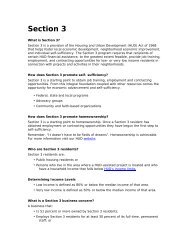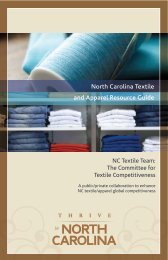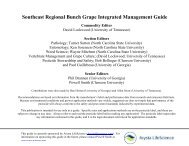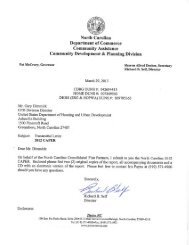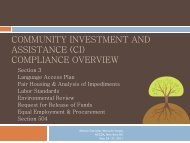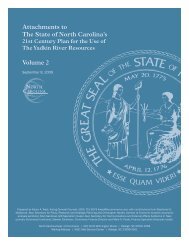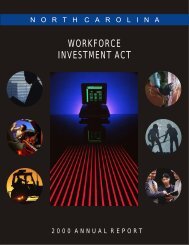Though not political in nature, the Embassy has noticed that general security concernsremain an issue for companies looking to invest in the country. Many companies find itnecessary to take extra precautions for the protection <strong>of</strong> their executives. They alsoreport increasing security costs for shipments <strong>of</strong> goods. The Overseas SecurityAdvisory Council (OSAC) monitors and reports on regional security for Americanbusinesses operating overseas. Eligible companies should become OSAC members.OSAC constituency is available to any American-owned, not-for-pr<strong>of</strong>it organization, orany enterprise incorporated in the U.S. (parent company, not subsidiaries or divisions)doing business overseas (https://www.osac.gov/).The <strong>Department</strong> <strong>of</strong> State maintains a Travel Alert for U.S. citizens traveling and living inMexico, available at: http://travel.state.gov/travel/cis_pa_tw/pa/pa_3028.html.CorruptionReturn to topCorruption, including bribery, raises the costs and risks <strong>of</strong> doing business. Corruptionhas a corrosive impact on both market opportunities overseas for U.S. companies andthe broader business climate. It also deters international investment, stifles economicgrowth and development, distorts prices, and undermines the rule <strong>of</strong> law.It is important for U.S. companies, irrespective <strong>of</strong> their size, to assess the businessclimate in the relevant market in which they will be operating or investing, and to have aneffective compliance program or measures to prevent and detect corruption, includingforeign bribery. U.S. individuals and firms operating or investing in foreign marketsshould take the time to become familiar with the relevant anticorruption laws <strong>of</strong> both theforeign country and the United States in order to properly comply with them, and whereappropriate, they should seek the advice <strong>of</strong> legal counsel.The U.S. Government seeks to level the global playing field for U.S. businesses byencouraging other countries to take steps to criminalize their own companies’ acts <strong>of</strong>corruption, including bribery <strong>of</strong> foreign public <strong>of</strong>ficials, by requiring them to uphold theirobligations under relevant international conventions. A U.S. firm that believes acompetitor is seeking to use bribery <strong>of</strong> a foreign public <strong>of</strong>ficial to secure a contractshould bring this to the attention <strong>of</strong> appropriate U.S. agencies, as noted below.U.S. Foreign Corrupt Practices Act: <strong>In</strong> 1977, the United States enacted the ForeignCorrupt Practices Act (FCPA), which makes it unlawful for a U.S. person, and certainforeign issuers <strong>of</strong> securities, to make a corrupt payment to foreign public <strong>of</strong>ficials for thepurpose <strong>of</strong> obtaining or retaining business for or with, or directing business to, anyperson. The FCPA also applies to foreign firms and persons who take any act infurtherance <strong>of</strong> such a corrupt payment while in the United States. For more detailedinformation on the FCPA, see the FCPA Lay-Person’s Guide at:http://www.justice.gov/criminal/fraud/docs/dojdocb.html.Other <strong>In</strong>struments: It is U.S. Government policy to promote good governance, includinghost country implementation and enforcement <strong>of</strong> anti-corruption laws and policiespursuant to their obligations under international agreements. Since enactment <strong>of</strong> theFCPA, the United States has been instrumental to the expansion <strong>of</strong> the internationalframework to fight corruption. Several significant components <strong>of</strong> this framework are theOECD Convention on Combating Bribery <strong>of</strong> Foreign Public Officials in <strong>In</strong>ternational
<strong>Business</strong> Transactions (OECD Antibribery Convention), the United Nations Conventionagainst Corruption (UN Convention), the <strong>In</strong>ter-American Convention against Corruption(OAS Convention), the Council <strong>of</strong> Europe Criminal and Civil Law Conventions, and agrowing list <strong>of</strong> U.S. free trade agreements.OECD Antibribery Convention: The OECD Antibribery Convention entered into forcein February 1999. As <strong>of</strong> December 2009, there are 38 parties to the Conventionincluding the United States (see http://www.oecd.org/dataoecd/59/13/40272933.pdf).Major exporters China, <strong>In</strong>dia, and Russia are not parties, although the U.S. Governmentstrongly endorses their eventual accession to the Convention. The Convention obligatesthe Parties to criminalize bribery <strong>of</strong> foreign public <strong>of</strong>ficials in the conduct <strong>of</strong> internationalbusiness. The United States meets its international obligations under the OECDAntibribery Convention through the U.S. FCPA. Mexico is a party to the OECDConvention.UN Convention: The UN Anticorruption Convention entered into force on December 14,2005, and there are 143 parties to it as <strong>of</strong> December 2009 (seehttp://www.unodc.org/unodc/en/treaties/CAC/signatories.html). The UN Convention isthe first global comprehensive international anticorruption agreement. The UNConvention requires countries to establish criminal and other <strong>of</strong>fences to cover a widerange <strong>of</strong> acts <strong>of</strong> corruption. The UN Convention goes beyond previous anticorruptioninstruments, covering a broad range <strong>of</strong> issues ranging from basic forms <strong>of</strong> corruptionsuch as bribery and solicitation, embezzlement, trading in influence to the concealmentand laundering <strong>of</strong> the proceeds <strong>of</strong> corruption. The Convention contains transnationalbusiness bribery provisions that are functionally similar to those in the OECD AntibriberyConvention and contains provisions on private sector auditing and books and recordsrequirements. Other provisions address matters such as prevention, internationalcooperation, and asset recovery. Mexico is a party to the UN Convention.OAS Convention: <strong>In</strong> 1996, the Member States <strong>of</strong> the Organization <strong>of</strong> American States(OAS) adopted the first international anticorruption legal instrument, the <strong>In</strong>ter-AmericanConvention against Corruption (OAS Convention), which entered into force in March1997. The OAS Convention, among other things, establishes a set <strong>of</strong> preventivemeasures against corruption, provides for the criminalization <strong>of</strong> certain acts <strong>of</strong>corruption, including transnational bribery and illicit enrichment, and contains a series <strong>of</strong>provisions to strengthen the cooperation between its States Parties in areas such asmutual legal assistance and technical cooperation. As <strong>of</strong> December 2009, the OASConvention has 33 parties (see http://www.oas.org/juridico/english/Sigs/b-58.html)Mexico is a party to the OAS Convention.Free Trade Agreements: While it is U.S. Government policy to include anticorruptionprovisions in free trade agreements (FTAs) that it negotiates with its trading partners, theanticorruption provisions have evolved over time. The most recent FTAs negotiated nowrequire trading partners to criminalize “active bribery” <strong>of</strong> public <strong>of</strong>ficials (<strong>of</strong>fering bribes toany public <strong>of</strong>ficial must be made a criminal <strong>of</strong>fense, both domestically and transnationally)as well as domestic “passive bribery” (solicitation <strong>of</strong> a bribe by a domestic<strong>of</strong>ficial). All U.S. FTAs may be found at the U.S. Trade Representative Website:http://www.ustr.gov/trade-agreements/free-trade-agreements. [<strong>In</strong>sert information as towhether your country has an FTA with the United States: Mexico has a free tradeagreement (FTA) in place with the United States, named NAFTA, which came into forceJanuary 1 st , 1994.
- Page 1:
Doing Business in Mexico: 2010 Coun
- Page 4 and 5:
Return to table of contentsChapter
- Page 6 and 7:
Before signing an agent/distributor
- Page 8 and 9:
In order to satisfy clients’ dema
- Page 10 and 11:
egardless of their geographic proxi
- Page 12 and 13:
The following companies organize tr
- Page 14 and 15:
to create a solid contract that inc
- Page 17 and 18:
Web ResourcesReturn to topU.S. Gove
- Page 19 and 20:
AgribusinessOverviewReturn to top20
- Page 21 and 22:
Automotive Parts and SuppliesOvervi
- Page 23 and 24:
ResourcesState of Jalisco Auto-part
- Page 25 and 26:
• Corporate training programs in
- Page 27 and 28:
excluding large hydroelectric proje
- Page 29 and 30:
Environmental SectorOverviewReturn
- Page 31 and 32:
Franchising SectorOverviewReturn to
- Page 33 and 34:
Hotel and Restaurant EquipmentOverv
- Page 35 and 36:
Housing and Construction ServicesOv
- Page 37 and 38: Internet and IT ServicesOverviewRet
- Page 39 and 40: Packaging EquipmentOverviewReturn t
- Page 41 and 42: With this boom in the packaging sec
- Page 43 and 44: • Integrated security solution(co
- Page 45 and 46: CATV: Today 30% of homes have pay-T
- Page 47 and 48: and expanding facilities and servic
- Page 49 and 50: destinations are typically not popu
- Page 51 and 52: The United States’ major agricult
- Page 53 and 54: 5.- Fresh Fruit (apples, pears, gra
- Page 55 and 56: ResourcesReturn to topThe USDA’s
- Page 57 and 58: order region and 16 percent for pro
- Page 59 and 60: U.S. Export ControlsReturn to topMe
- Page 61 and 62: and organs, almost all medical prod
- Page 63 and 64: Organizations that develop NMX - Me
- Page 65 and 66: Certification Bodies:EMA has accred
- Page 67 and 68: The LFMN and its Regulation establi
- Page 69 and 70: NOM-137-SSA1-2008 Regulatory inform
- Page 71 and 72: Mexico is the country with the larg
- Page 73 and 74: Return to table of contentsChapter
- Page 75 and 76: SECTION 2: SECTORS RESERVED FOR MEX
- Page 77 and 78: majority share (about 75 percent) o
- Page 79 and 80: Expropriation and CompensationRetur
- Page 81 and 82: contribution. The Mexican Bank for
- Page 83 and 84: Government continues to work with i
- Page 85 and 86: to banks and non-bank banks. Despit
- Page 87: government sent the sent the Federa
- Page 91 and 92: • Information about the OECD Anti
- Page 93 and 94: Greece, Italy, Netherlands, Portuga
- Page 95 and 96: Foreign Direct Investment Realized
- Page 97 and 98: Return to table of contentsChapter
- Page 99 and 100: individuals who are equally new to
- Page 101 and 102: sector, which is expected to uncove
- Page 103 and 104: Return to table of contentsChapter
- Page 105 and 106: For further information please visi
- Page 107 and 108: Local Time, Business Hours, and Hol
- Page 109 and 110: Mr. Garth ThorburnDirector, U.S. Ag
- Page 111 and 112: Asociación Nacional de Importadore




